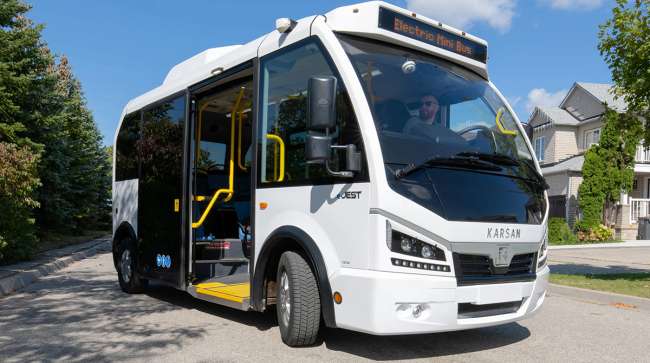Damera’s Karsan eJest, a 19-passenger electric minibus with a range of 130 miles. (Damera Corp./TNS)
As Lion Electric faces liquidation and the auction of its shuttered Joliet, Ill., electric bus factory, the state has announced another Canadian EV bus manufacturer will be opening a plant in Peoria, Ill.
Damera Corp., an Ontario-based electric bus company, plans to invest $31.5 million and create 90 full-time jobs to open its first U.S. assembly plant, backed by state tax incentives.
The leased 55,000-square-foot facility will be used to sell, service and build the Karsan eJest, a 19-passenger electric minibus with a range of 130 miles. Billed as a zero-emission public transportation solution for suburban areas, the bus has already been deployed in several communities in the U.S. and Canada.
“Over the past six years, Illinois has pushed to solidify our status as a hub of the EV future — and put our shoulder to the wheel to get that vision off the ground and on the road,” Gov. JB Pritzker said in a news release May 14. “Through our competitive incentive programs, workforce development and other business attraction efforts, the state is bringing in companies like Damera that not only create jobs and opportunity for our people, but commit themselves to our communities.”
Another major step forward for the EV industry in Illinois.
Damera Bus USA is a leader in clean energy transit that I’m proud to announce will open its first-ever US assembly plant in the Greater Peoria region — a $31.5M investment that will leave behind a greener future. pic.twitter.com/yqr1clZ2DX
— Governor JB Pritzker (@GovPritzker) May 14, 2025
Pritzker made the announcement with Damera executives May 14 as part of a business development trip in Washington, D.C. The company first met with Illinois development representatives at a trade summit last summer in Maryland.
Damera was incentivized to build its first U.S. plant in Illinois through the state’s Reimagining Energy and Vehicles In Illinois (REV Illinois). The 2021 legislation offers up to a 75% credit on state income tax for EV manufacturers for meeting agreed upon investment and job creation targets.
“As we continue to expand Damera Bus USA LLC’s presence in the United States, our commitment to fostering long-term growth and job creation in the Peoria area remains unwavering,” Roger D’Hollander, Damera’s chief operating officer, said in the news release. “This investment not only strengthens the local economy but also creates hundreds of new opportunities for the community.”
The company, which has its U.S. headquarters in Florida, is the exclusive North American distributor of the Karsan eJest. The minibus is manufactured in Turkey and the final assembly is currently in Canada.
Launched about two years ago, the eJest has about 80 buses in service in the U.S., including Nantucket, Mass., and Santa Maria, a city of about 110,000 people on California’s central coast, whose public transit system began using 14 of the electric minibuses in 2023.

Lion electric school buses at the Lion Electric plant. (E. Jason Wambsgans/Chicago Tribune/TNS)
The Peoria plant will ultimately assemble the entire bus, including a newer and slightly larger 25-foot version due out in about two years, D’Hollander told the Tribune. Once production on the new model ramps up, the company expects to employ 300 to 500 people in Peoria, he said.
The buses cost about $250,000 to $300,000 each, D’Hollander said.
Illinois has made significant strides in EV manufacturing, most notably with Rivian, which began building its full-size electric R1T pickup truck, the R1S SUV and its commercial delivery vans in September 2021 in a former Mitsubishi auto plant on the outskirts of Normal.
Rivian, which is gearing up to launch its new midsize R2 electric SUV, is expanding its plant and building an adjacent $120 million supplier park to facilitate increased production.
At the same time, Lion Electric, which announced its electric school bus factory near Joliet with great fanfare four years ago, is facing liquidation after a short manufacturing run.
Opened in 2023, with plans to ramp up production at its 900,000-square-foot plant and create 1,400 jobs, Lion Electric suspended operations in December and temporarily laid off 400 workers in Canada and the U.S.
Last week, a Canadian court-appointed monitor said the company is likely to be liquidated. An auction for the plant’s equipment is set for May 21.






